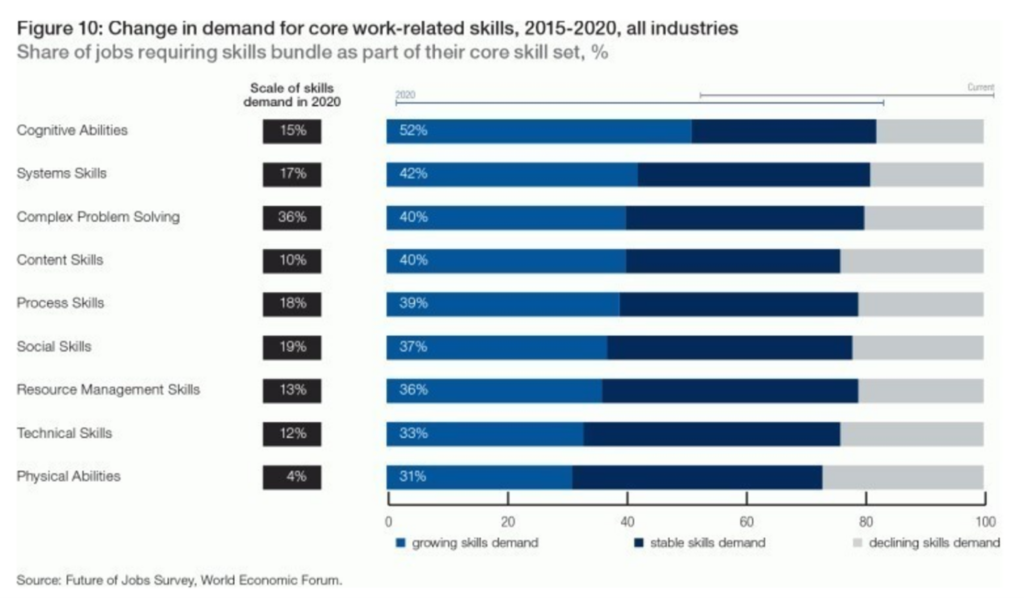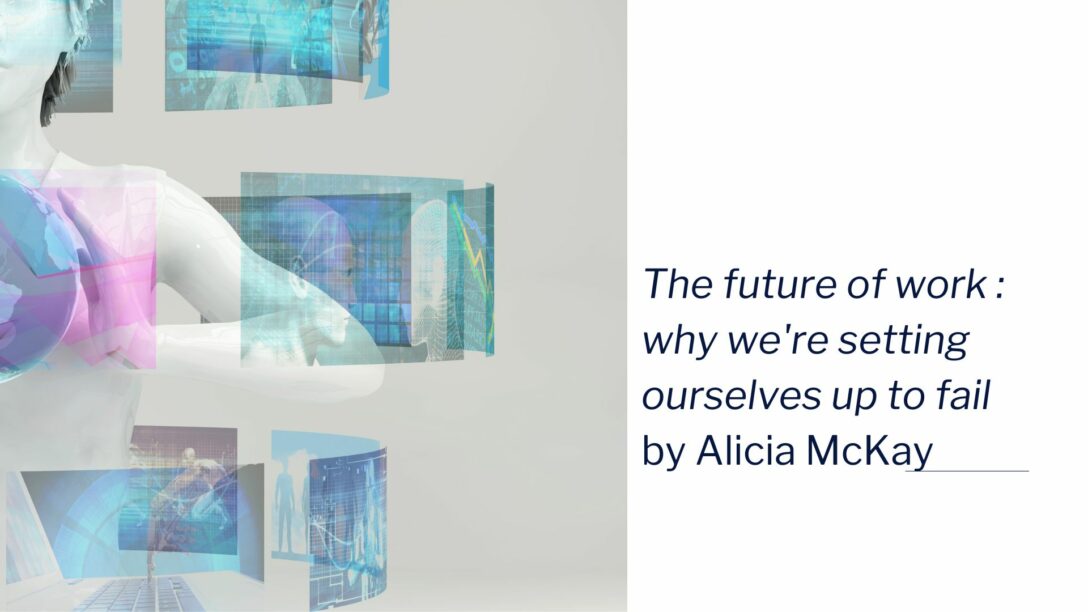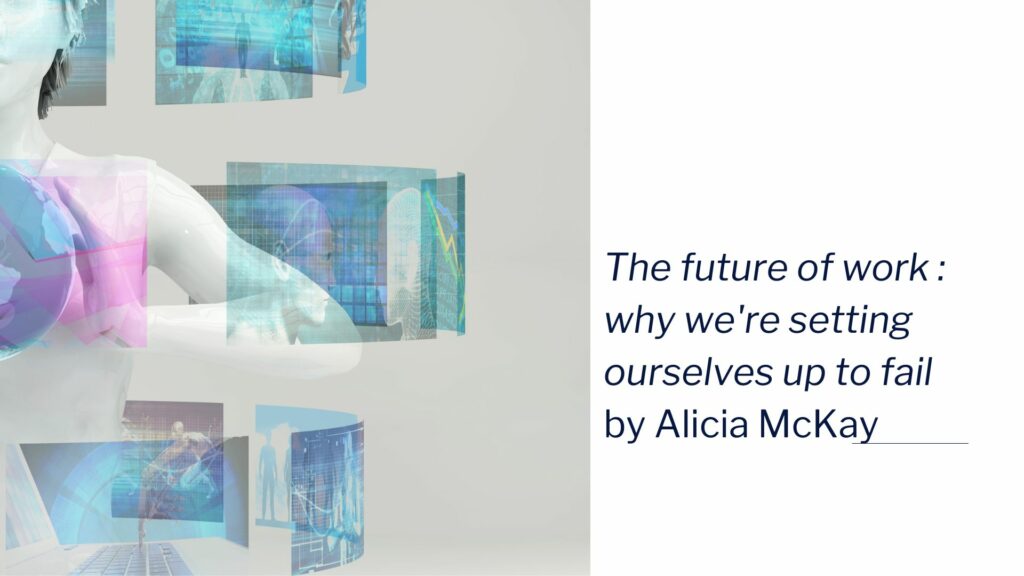“The future is already here — it’s just not evenly distributed.”
William Gibson
When ATMs came on the scene, economists, politicians and the media panicked. With people no longer required to give the correct change and stamp deposit slips, we were experiencing the early stages of the robot revolution. Automation was to rob bank tellers of their jobs!
The reality, however, was far more nuanced. In fact, there are more bank tellers now than ever. Rather than widespread job loss, the automation of routine tasks has allowed tellers to shift their focus to higher value tasks like customer and relationship management, financial services and sales.
The world has changed
Examples like this are playing out across all industries and organisations. As the nature of work changes, new technology is introduced and social norms evolve, we need a different set of skills from our people and leaders. The pandemic abruptly accelerated this process, as we sprang into action learning to work remotely, manage business interruption and adapt to virtual environment.
The challenge for ambitious professionals and learning and development managers is working out what to focus to equip our leaders for all this change. What skills should we be teaching and learning? How do we make sure we aren’t being left behind?
The answer lies in reframing the question.
Asking better questions
For decades, we’ve followed a classic trajectory for leadership development: we teach people to be operational experts, then we give them some management training and, if they’re lucky, some personal development stuff to work out their Myers-Briggs or what bird they are.
But it’s not working anymore. The half-life of a skill has dropped to less than five years – which means that while your typing skills may have served you for life 20 years ago, that new coding skillset will be out of date in little more time than it takes to do a degree.
A 2019 World Economic Forum report revealed that less than half of chief HR officers were confident that their workforce strategy prepared them for the future. Deloitte’s Readiness Report, from the same year, revealed that only one in four business leaders were highly confident their workforce has the skill sets needed for the future – and this was all before we’d heard the word ‘coronavirus’.
Our development pathways are lagging behind, resulting in leadership teams full of experts in their field, who know how to balance a budget but are battling with the stuff people really need from them. Things like… how to respond well to change when things are uncertain and volatile. How to make good decisions in a complex environment. How to create smarter systems for complicated organisations, and how to maximise performance when people are overwhelmed. How to connect meaningfully and get people on board with change, when the way forward is unclear and their jobs feel under threat.
Strategy is the future of work
All of these skills are strategic skills.
Rather than trying to predict the technical and operational capabilities we need the most, we should be thinking about how to tackle our strategic capabilities, so that we’re OK even when our operational demands change.
The strategic capacity of our leaders is the most important determinant of personal and organisational success. When we prioritise quality thinking, big-picture perspective and insightful questions, we create a culture that bends and flexes to uncertainty, we build powerful organisations and equip people with what they need to succeed regardless of what’s happening around us.
The five untaught skills of a strategic leader
Strategic leadership is all about context. Strategic leaders ask questions like: “what’s going on?” “what does that mean?” “what should we be thinking differently about?” and “what are we not seeing?”.
Strategic leaders have mastered five critical skills.
1. Flexibility
To lead through complexity, we need to be OK with change. Flexible leaders know that leadership isn’t about getting things done in spite of their environment, but because of it. They have the awareness, agency and resilience to withstand pandemics, natural disasters and technological disruption, because they stay flexible to the world around them.
2. Decisions
Making good decisions is a learned skill. Decisive leaders know it’s not what they think, but how they think that matters, focusing on providing direction that drives action. They know that no cost-benefit analysis will save them, without the skills to capture diverse input and build in tolerance for change.
3. Systems
Strategic leaders think in systems, because they know that suc¬cessful organisations dismantle siloes and work out how things fit together. Systems leaders don’t settle for what’s in front of them, focusing instead on the messy stuff – context, relationships and dependencies. They stop finger-pointing and problem-solving, to pull levers and dis¬solve issues before they take hold.
4. Performance
True performance isn’t operational excellence or time management – it’s focus. Strategic leaders understand that their most valuable resource is their attention, optimising their environments and teams to invest in the factors that make a real difference. They know that once they eliminate distraction and insist on value, quality and accountability, there’s nowhere left to hide.
5. Influence
Influential leaders know that political savvy isn’t slimy; it’s non-negotiable for impact at scale. They know that their integrity, reputation and relationships are what makes the difference. As our environment continues to shift, it will be the leaders who can bring others with them whose ideas will take hold.
Lessons that count
In the knowledge economy, we’ve got access to all the technical information and instruction in the world at the touch of a button. If you need finance knowledge, watch a video and get your head around it in 15 minutes. If you need marketing expertise, Google for a freelancer and book the job in online.
But if you need to understand how best to adapt to your environment, how to make quality decisions that capture the big picture, how to drive focus and how to take people along on the journey… well, it’s time for strategic leadership. Let’s shift the dial.
Alicia McKay, author of ‘You Don’t Need An MBA: Leadership Lessons that Cut Through the Crap’ is a Wellington strategic leadership expert and founder of the NaMBA programme – a game-changing alternative to traditional leadership education. Alicia works with leaders and teams to spark strategic shifts in the way they think, work and lead. For more information about how Alicia can help your team visit www.aliciamckay.co.nz
Copies of Alicia’s books are available in different formats in Wellington City Libraries’ collection. If you want to know more check out these :
You don’t need an MBA : leadership lessons that cut through the crap / McKay, Alicia
“The 21 lessons in You Don’t Need an MBA are practical rather than academic. They are meant for the fast-paced, new world of leadership and for leaders who are looking for practical solutions to everyday challenges. Alicia McKay’s writing is engaging and direct. Readers immediately have confidence that her approach works – no further post-grad studies required. Leadership expert, Alicia McKay believes that leaders are made, not born. But they are not made in the lecture halls and seminar rooms; you don’t need an MBA to be an effective leader. The ability of next-generation leaders to cope with constant change has never been more important or more poorly understood. The world keeps throwing curveballs, and it’s easy to get overwhelmed. It’s not that we don’t know we need to change. The gap isn’t knowing, it’s doing. The leaders of tomorrow need to change today. They need to get smart, be strategic about the next step and expand their range, to face a complex and uncertain future. They need paradox: clear values and open minds, high performance and meaningful space, dedication to detail and big picture perspective. They need to ask different questions, design different options and most of all, they need to do that with others on the same journey. You Don’t Need an MBA demystifies the skills leaders of the future need and epitomises the brave new world of leadership; united leadership that focuses on real outcomes, not quick-fixes. Alicia McKay draws on the latest global thinking on leadership and outlines a way forward, in plain English and with actionable steps.” (Catalogue)
Also available as an e-book
From strategy to action : a guide to getting shit done in the public sector / McKay, Alicia
“Lack of clarity on purpose, vision and priorities plague all levels of the public sector, with short-termism and reactive management crowding out opportunities to develop genuine strategic capability.Operating in this environment without pushback is no longer enough, for public managers tired of late, unfinished and failed initiatives. Nor is it enough for a jaded public, who rightfully expect value from their contribution to the social contract. From Strategy to Action provides a framework to shift the needle and make progress on the big picture. Using the tools and advice compiled in this book, public managers who are ready to seize agency and do things differently will be pleasantly surprised at the impact they can have on their teams, organisations and communities”–https://aliciamckay.co.nz.” (Catalogue)



